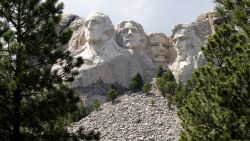Some American federal holidays are fairly simple and celebrated by everyone, such as Independence Day and Thanksgiving. Others are controversial, like Columbus Day. And then there is the case of the third Monday of February.
The holiday we celebrate federally on this day is both controversial and one few people seem to care about.
You’ll notice I haven’t referred to what today’s holiday is because no one seems to agree what to call it or when it should take place. Sometimes, state agencies cannot even agree on what to call the holiday (see Illinois). Allowing for all that, about 14 states appear to refer to the holiday as President’s Day (note the apostrophe before the letter s). Another 10 call it Presidents’ Day (note the apostrophe after the letter s). And two claim the holiday as Presidents Day (no apostrophe).
Other incarnations of the holiday exist too. Washington’s Birthday is fairly popular, with six states – and the federal government – celebrating it. Mississippi opts for George Washington’s Birthday, at least according to its state court system. Our first president’s home state of Virginia drops the reference to “birthday” and goes with George Washington Day. North Dakota goes a little outside the box under state law, choosing not to name the day and instead going with the snappy “recognition of the birthday of George Washington.”
Six states combine the name Washington (sometimes with “George”) with some combination of the names (Abraham) Lincoln, Thomas Jefferson, Presidents’, President’s or Daisy Gatson Bates and the word “day” or “birthday.”
Confused yet? Nine states don’t even celebrate the day. Three that do (including Georgia) celebrate it in either November or December around Thanksgiving or Christmas.
To be clear, some holiday around Washington’s day of birth that celebrates a president or presidents has been around for a long time. Federally, it’s been recognized since 1879.
In the mid-20th century, many industries, including the travel industry, wanted to create a “super holiday” for presidents given that Lincoln’s birthday (February 12 and never federally recognized) is close to Washington’s. Thanks to the Uniform Monday Holiday Act of 1968, such a holiday was established on the third Monday of February. Federally, it was called Washington’s Birthday to not upset members of Congress from Virginia.
The vast majority of states, however, didn’t follow suit in keeping the name Washington’s Birthday.
Part of the problem is that a lot of states have also created a super holiday meant to celebrate more than just Washington. Calling the third Monday in February something with the words “president” and “day” worked better. Only a handful of states still celebrate Lincoln’s Birthday (including his home state of Illinois) compared with about half of them in 1940.
Of course, just to add to the ridiculousness, Illinois manages to have both a Presidents’ Day and Lincoln’s Birthday, without a day specifically dedicated to Washington. That is if you believe the state treasurer. The Illinois secretary of state designates the day as Washington’s Birthday.
Speaking of Washington, his actual birthday of February 22 never falls on the third Monday of February. If February 22 is a Monday, it would be the fourth Monday of February.
To me, though, what makes the whole argument of what to call the third Monday in February fun is how inconsequential it really is. Most Americans don’t really care about the holiday.
An examination of Google Trends reveals that only Columbus Day ranks lower in online searches by Americans of federal holidays. A majority of states don’t even celebrate Columbus Day, and a number of states have decided to mark something else on that day (e.g. Indigenous Peoples’ Day).
There are a bunch of non-federal holidays that beat Washington’s Birthday in Google searches as well. This includes, perhaps not surprisingly, Valentine’s Day.
A poll from 2012 further makes the point. Adults were asked what holiday should be eliminated, if one needed to be. Among the options listed, Presidents’ Day came in first at 35%.
And back when the idea of making Washington’s Birthday a holiday that always fell on a Monday was being discussed, most Americans were not in favor. Just 35% wanted Washington’s Birthday to be consistently observed on a Monday, according to a 1967 Louis Harris & Associates poll. Lawmakers went against the public and set the Monday date anyway.
It doesn’t seem like anyone really cared.



















